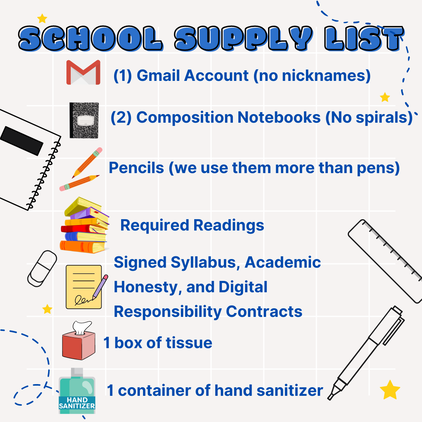We dig deeper than the surface
#discovery #investigation #knowledge
My Courses
English III
English IV
Creative Writing:
AP/IB English Literature
AP/IB English Language:
IB Theory of Knowledge (TOK)
AP Research:
OnRamps: Introduction to Rhetoric: Reading, Writing and Research (Engl 1301)
- Literature: the critical reading and evaluation of American Literature: novels, poetry, drama, short stories, informational texts, visual texts and images, and the analysis of English Literature and Language, and rhetoric.
- Grammar: extensive study of mechanics, usage, grammar and syntax.
- Critical Thinking: problem-finding, problem-solving, imagining a solution, and creating and solving problems.
- Reading and Writing: To form, shape, and mold your ability to think, speak, communicate, socialize, create, and make a fruitful living.
English IV
- Literature: the critical reading and evaluation of British Literature: novels, poetry, drama, short stories, informational texts, visual texts and images, and the analysis of English Literature, Language, and rhetoric.
- Grammar: extensive study of mechanics, usage, grammar and syntax.
- Critical Thinking: problem-finding, problem-solving, imagining a solution, and creating and solving problems.
- Reading and Writing: To form, shape, and mold your ability to think, speak, communicate, socialize, create, and make a fruitful living.
Creative Writing:
- Reading and Writing: This class focuses on the writing various forms of literature, including fiction, nonfiction (short and long), poetry (several styles), film/television and stage plays. The goal is to form, shape, and mold your ability to think, speak, communicate, socialize, create, and make a fruitful living, and together, you will.
AP/IB English Literature
- Literature: the critical study and global analysis, interpretation and presentation of written and spoken texts from a wide range of literary forms and non literary texts.
- Grammar: extensive study of mechanics, usage, grammar and syntax.
- Critical Thinking: problem-finding, problem-solving, imagining a solution, and creating and solving problems.
- Reading and Writing: To form, shape, and mold your ability to think, speak, communicate, socialize, create, and make a fruitful living.
AP/IB English Language:
- Nonfiction: the evaluation various nonfiction texts in order to examine language and their connection to global issues. Students develop discussion skills that will help them think, speak, listen and write better.
- Critical Thinking: problem-finding, problem-solving, imagining a solution, and creating and solving problems.
- Reading and Writing: To form, shape, and mold your ability to think, speak, communicate, socialize, create, and make a fruitful living.
IB Theory of Knowledge (TOK)
- Written Essay: a 1,600-word essay that prompts students to examine human experiences and connect them to global issues.
- Oral Presentation: students give a 20-minute presentation where students reflect on the nature of knowledge, and on how we know what we claim to know.
- Critical Thinking: problem-finding, problem-solving, imagining a solution, and creating and solving problems.
- Reading and Writing: To form, shape, and mold your ability to think, speak, communicate, socialize, create, and make a fruitful living.
AP Research:
- Research: an independent, year-long, self-directed research project that results in a 4,000-word paper. Students will synthesize and apply the techniques of both creative and critical thinking skills to generate new ideas, overcome roadblocks, develop innovative solutions and solve problems.
- Capstone: the second course in the AP Capstone experience, allows students to deeply explore an academic topic, problem, issue, or idea of individual interest. Students design, plan, and implement a yearlong investigation to address a research question that results in a 4,000-word essay.
- Critical Thinking: problem-finding, problem-solving, imagining a solution, and creating and solving problems.
- Reading and Writing: To form, shape, and mold your ability to think, speak, communicate, socialize, create, and make a fruitful living.
OnRamps: Introduction to Rhetoric: Reading, Writing and Research (Engl 1301)
- Reading and Writing: a writing seminar course in argumentation that establishes rhetoric as an art of civic discourse.
- Research: Students will research and analyze the various positions held in any public debate and to advocate their own position effectively to a target audience.
- Students will explore the ethics of argumentation, explaining what it means to “fairly” represent someone with whom one disagrees or how to responsibly address a community with particular values and interests.
- Students will investigate rhetorical appeals and navigate the rhetorical situation in order to master the art of persuasion so that they can successfully articulate and defend their viewpoints, influence others, and effectively communicate.
- Students will advance the critical writing and reading skills needed to succeed in college and in professional careers. Students can expect to read and write daily. This course fulfills the University of Texas at Austin core curriculum requirement for English Composition (Texas core code 010).
Course Objectives
In any of my English courses, students will:
- Learn to enjoy and appreciate analytical reading and purposeful writing.
- Demonstrate an understanding of grammar, mechanics and usage to write well-developed content.
- Generate new vocabulary words in the proper context.
- Analyze societal and ethical issues, problems and values through the critique of literature.
- Evaluate various writings and literary forms in order to examine human experiences and connect them to global issues.
- Spiral technology as a learning tool to enhance research skills.
- Develop discussion skills that will help students think, speak, listen and write better.
- Synthesize and apply the techniques of both creative and critical thinking skills to generate new ideas, overcome roadblocks, develop innovative solutions and solve problems.
Supplies
All students are expected to be prepared and organized for class. To help in this endeavor, you are required to keep an Interactive Notebook and the list of mandatory supplies below for the course.
Note: Throughout a typical day, we touch the same papers, pencils, desks, chairs, books, computers, door handles, rails, etc., so it is important and necessary to sanitize often.
Course Overview
Know the Code
Know These, Get Connected, Write Them Down
Please write these codes down in the resources section of your Interactive Notebook. That way, you will always be able to find them. Write down usernames and hints of your passwords, and set due dates in your phone.
www.englishfury.com
[email protected]
Flipgrid
To get started:
Mixed Ink
To get started:
Interactive Notebook (Face-to-Face)
Google Classroom (Virtual)
Note: If you are unable to access any of these tools, please check this website for class instruction. You will find what you need under My Assignments tab, and if that doesn't work, send me an email. Make it a great year!
Please write these codes down in the resources section of your Interactive Notebook. That way, you will always be able to find them. Write down usernames and hints of your passwords, and set due dates in your phone.
www.englishfury.com
[email protected]
Flipgrid
To get started:
- Get the Code.
- Get your personal ID.
- Visit www.flipgrid.com.
- Get connected.
- Start participating in class discussions!
Mixed Ink
To get started:
- Visit Mixed Ink.
- Read and respond to the prompt.
- Be a part of the conversation! Reply to some classmates.
- Due weekly.
Interactive Notebook (Face-to-Face)
- You'll need two composition notebooks.
- Click here to assemble them as an Interactive Notebook.
Google Classroom (Virtual)
- Go to classroom.google.com.
- Click the + to join a class.
- Get the Code.
- Start learning!
Note: If you are unable to access any of these tools, please check this website for class instruction. You will find what you need under My Assignments tab, and if that doesn't work, send me an email. Make it a great year!
Writing Requirements
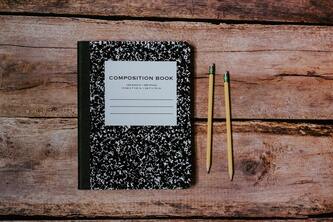
We will practice short-form writing every day. However, two days a week, you will practice long-form writing and theme writing. The occasion? Writing Wednesday and Thesis-writing Thursday (this practice will be adjusted for Block schedules). You will either learn and apply a new writing strategy/skill or develop an existing one.
You will learn to write creatively, socially, academically, and professionally, step-by-step. Major writing assignments will be timed and scored according to writing rubrics, which will express the central guidelines/goals of the activity. You should use it as a guide to focus the majority of your energy. All rubrics will include elements about the strength of writing, so for this reason, you should constantly seek to identify and improve your own structural and grammatical weaknesses.
Offline, all of your writings will be completed in your Interactive Notebook, which will be left each day in a designated area in the classroom. This makes it easier for me to conduct notebook checks and easier for you to keep up with your notebook.
During online learning, your writings will be completed in Google Docs and uploaded to Google Classroom.
Writings that you receive back after grading will have notations made on them to help guide you toward fixing problem areas. You are encouraged to revise and resubmit essays. As an absolute minimum, you are expected to review these comments and use them as an additional strategy to improve language, structure and rhetorical skills. As the tasks become more complex and the expectations more demanding, students who fail to self-reflect during the course might suffer academically.
Often, we will peer edit, provide peer-to-peer feedback, and you will receive feedback during one-on-one, group, or whole class time with me.
Short-form writing on a regular basis builds your writing stamina and helps with critical thinking, problem-finding, and problem-solving when you need to think on your toes. So, lean in!
You will learn to write creatively, socially, academically, and professionally, step-by-step. Major writing assignments will be timed and scored according to writing rubrics, which will express the central guidelines/goals of the activity. You should use it as a guide to focus the majority of your energy. All rubrics will include elements about the strength of writing, so for this reason, you should constantly seek to identify and improve your own structural and grammatical weaknesses.
Offline, all of your writings will be completed in your Interactive Notebook, which will be left each day in a designated area in the classroom. This makes it easier for me to conduct notebook checks and easier for you to keep up with your notebook.
During online learning, your writings will be completed in Google Docs and uploaded to Google Classroom.
Writings that you receive back after grading will have notations made on them to help guide you toward fixing problem areas. You are encouraged to revise and resubmit essays. As an absolute minimum, you are expected to review these comments and use them as an additional strategy to improve language, structure and rhetorical skills. As the tasks become more complex and the expectations more demanding, students who fail to self-reflect during the course might suffer academically.
Often, we will peer edit, provide peer-to-peer feedback, and you will receive feedback during one-on-one, group, or whole class time with me.
Short-form writing on a regular basis builds your writing stamina and helps with critical thinking, problem-finding, and problem-solving when you need to think on your toes. So, lean in!
NaNoWriMo
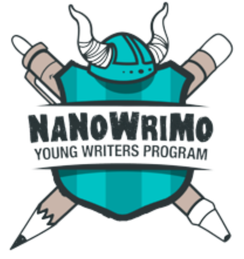
National Novel Writing Month, or NaNoWriMo, is a writing challenge that takes place in November. We participate! From the start of school until November, we build our writing stamina to participate in this challenge to write a 25,000-word novel in a month! I can't wait to see the stories we'll create! Click here to learn more about the challenge and the organization!
#TeenWritersProject
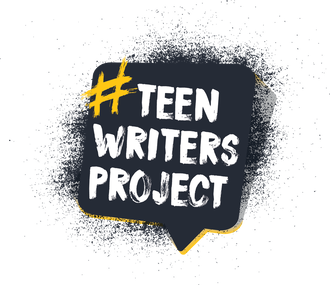
#TeenWritersProject is an organization that provides a collaborative and engaging space for teens to write, be published, and get paid! They also publish The #TWP Quarterly, a lit zine that features the curated poetry, prose, and artwork of teens.
In our class, one each month, you will either choose a writing piece you have been working on or create something new, polish it, and submit it for publication consideration.
Check out the submission guidelines and learn more about the organization, here.
In our class, one each month, you will either choose a writing piece you have been working on or create something new, polish it, and submit it for publication consideration.
Check out the submission guidelines and learn more about the organization, here.
Reading Requirements

This is an English class. Therefore, we will READ throughout the course of the year. Novels, short stories, poems, song lyrics, articles, ads, texts, tweets, posts, etc., will all be required readings. To that end, during face-to-face learning, you will be required to read hard copies of novels for class use so that you can master annotating. If online, I will provide you with soft copies in an email or in our virtual classroom.
Whether offline or online learning, you will be graded on annotating and color marking texts, discussions, responses, notes, level questions, and mind maps. So, make sure that you read ALL of the Reading is fun AND mental! section.
Book Purchases:
When I can, I provide the texts for you. But if you're a bibliophile, like me, and you love the "experience" of reading: how the pages smell, turn, take pencil and pen on its pages, creases, etc., feel free to purchase your own print copies. Titles are provided in your Course Outline so that you can budget your purchases in case you opt to purchase copies of the texts we'll read.
Whether offline or online learning, you will be graded on annotating and color marking texts, discussions, responses, notes, level questions, and mind maps. So, make sure that you read ALL of the Reading is fun AND mental! section.
Book Purchases:
When I can, I provide the texts for you. But if you're a bibliophile, like me, and you love the "experience" of reading: how the pages smell, turn, take pencil and pen on its pages, creases, etc., feel free to purchase your own print copies. Titles are provided in your Course Outline so that you can budget your purchases in case you opt to purchase copies of the texts we'll read.
D.E.A.R

Just like with writing, we build our reading stamina, reading comprehension, and critical thinking skills by reading. Although we read daily (excerpts, articles, posts, etc.), once a week, we will Drop Everything And Read from bell to bell. You will read a text of your choice or an assigned class text, then complete a Reader's Response or complete a Reading Log to challenge your thinking about the text.
ACT/SAT/ASVAB Exam Requirements

I want you all to at least agree to seriously consider taking these standardized exams whether you intend to go to college or the military or not. Your mindset today will be completely different by the time you graduate. It won't hurt to be prepared.
Online and Recurring Assignments

Online assignments prepare you for success when taking virtual classes in high school or in college, and/or writing or working professionally online. Because the Internet makes getting your work done accessible and convenient, you are not excused from completing assignments if you are absent and are aware of an assignment before your absence.
(Also, since the deadline is generous, the starred assignment cannot be made up):
(Also, since the deadline is generous, the starred assignment cannot be made up):
- Quick Writes. We write everyday for at least five to ten minutes. If you come into class late, make sure you make these up. These are graded.
- Reading Logs. After you read a text, you'll complete a brief log to show that you understand the text you are reading.
- Reader's Response. After reading a text, you'll give your opinion and defend it in 2 to 3 sentences.
- Writer's Response. After reading a text, you'll give an analysis of the writer's style and how the piece was written in 3 to 5 sentences.
- Article of the Week. Each week, if assigned, you will identify one major news event. These news topics should be about current issues. Your job is to become a global citizen by keeping track of breaking news and world events.
- *Mixed Ink. Each week, you'll respond to a prompt posted on our class blog. These posts can help you become socially responsible, form a worldview, know what's going on in the world around you, improve your critical thinking skills and/or enhance your creativity and ability to articulate your thoughts in writing.
Daily Dedication
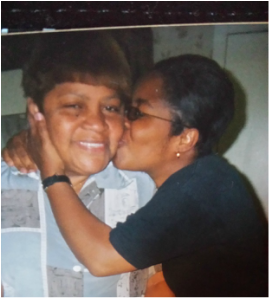
We will start each day with a Daily Dedication of someone you admire or who has had an impact on your life in some way or on how you live. (You only have to do it once each week.)
The Purpose
How To
Preparation:
The Purpose
- Some of you are nervous or shy to speak in front of the class. But doing this activity models vulnerability and shows that we all are human.
- It’s also a way to start class with a positive vibe.
- It opens your views and perspectives about people you don’t really know and reveals some differences in how we all live.
- It brings trust, laughter, and respect for people and keeps it at the top of your mind.
- It loosens you up and makes you less shy about public speaking.
How To
- Display an image of the person you admire.
- Start with: I want to dedicate today’s class to… and explain who and why for about 60 seconds.
- When the speaker finishes, the class will snap their fingers rapidly for about 5 seconds.
Preparation:
- Always have a photo ready of someone you admire: a real person, a fictional character, a celebrity—whomever. Click the address to send it beforehand to: [email protected].
- Virtual/Hybrid Class: display the image on your screen.
- Face-to-face Class: display an image on the overhead and stand before the class.
- Finger snaps are a quiet signal to show unity, agreement, and affirmation in the literary world that originated with Greeks. It's standard practice after poetry readings, especially, and at conferences, university symposiums, and even at the end of formal dinners.
Fine Print
Class Norms, Codes of Conduct, Consequences, Policies, etc.
These rules apply whether you attend class in person or in a virtual classroom setting.
Class Norms and Codes of Conduct
Class Norms for English Fury
1) Respect yourself, teacher, classmates, their property, the school and your upbringing.
2) Pay attention, stay alert and engaged, participate, and follow directions always and all ways.
3) Do not let technology be a problem (cells, ear buds, headphones, etc.)
4) Come to class everyday prepared with your supplies and required readings.
5) Do not prevent me from teaching or others from learning.
6) Keep things clean: the room, desks, chairs, floor, yourself. NO FOOD OR DRINKS.
7) Practice mindful online learning when called for.
1) Respect yourself, teacher, classmates, their property, the school and your upbringing.
2) Pay attention, stay alert and engaged, participate, and follow directions always and all ways.
3) Do not let technology be a problem (cells, ear buds, headphones, etc.)
4) Come to class everyday prepared with your supplies and required readings.
5) Do not prevent me from teaching or others from learning.
6) Keep things clean: the room, desks, chairs, floor, yourself. NO FOOD OR DRINKS.
7) Practice mindful online learning when called for.
Class Rules Defined
- Respect yourself, your teacher, your classmates, the school, your upbringing.
- Do not behave in an uncouth manner.
- Do not bully, threaten, bash others verbally or make fun of anyone different than you.
- Do not unplug ANYTHING in our classroom unless asked by a teacher.
- Students CANNOT use my microwave (I'm vegan and don't want meat/dairy splashes).
- Students CANNOT use my coffee maker under any circumstances.
- Do not touch any personal items that belong to me or others. (Black stand in the back.)
- Pay attention, stay alert and engaged, and follow directions always and all ways.
- Participate in discussion (wrong answers are learning tools).
- Do not allow yourself to be distracted.
- Do what is asked of you by me, even if you doubt the validity.
- Do not let technology be a problem.
- No cells, ear buds, headphones, etc.
- No hoodies trying to hide #1.
- Attend class prepared with your supplies and required readings.
- Have your Interactive Notebook daily.
- Have your text for reading daily.
- Make sure you have pencils, adequate Wi-Fi/a solid connection.
- DO NOT prevent me from teaching or others from learning.
- When I teach, you write. When I write, you write.
- If someone is speaking, raise your hand if you wish to speak (on- or offline).
- Do not interrupt when I am one-to-one with another student.
- Do not engage in lengthy off-topic conversations.
- Do not behave in a disruptive or distracting way.
- Keep things clean.
- Clean up after yourself so your desk is ready for the next class.
- Return classroom materials to the proper storage place if used.
- Keep your language clean.
- Make sure to put your Interactive Notebooks up the correct way.
- Mindful Online Learning
- When we are learning online, the expectation is that you have your cameras on and mics muted until you are ready to speak.
- It is ineffective for me as a teacher and you as a student to speak to a dark screen or one with a still image or name.
- Having your cameras on builds rapport and allows us all to read and interpret nonverbal cues.
- Be active and participate in whole group and in Breakout Rooms.
- Respect classmates' privacy. Do not ever take screenshots, photos or recordings of classmates.
- Raise your hand with the reaction button to speak and use the chat for questions.
- Do not interrupt when I am teaching or a classmate is talking or presenting.
No Distractions Discipline Plan
In the event that you MAKE THE CHOICE to break the rules, here are your consequences:
1.) Verbal warning with note, email or call to parent/guardian
2.) Student/Teacher Conference with note, email or call to parent/guardian
3.) Written referral and administrator contact
1.) Verbal warning with note, email or call to parent/guardian
2.) Student/Teacher Conference with note, email or call to parent/guardian
3.) Written referral and administrator contact
Student Dress Code Policy
Attendance Policy
In-person Learning: Students must attend class. If a student accumulates too many absences (excused and unexcused), district policy and state law mandate that credit be denied. There will be no flexibility on this point. It is the student’s responsibility to check the attendance reports generated in the attendance office, and notify me of any errors prior to the end of the six weeks. Failure to check this will result in the error remaining on the attendance report.
Virtual Learning: During our time together, the expectation is that your camera is on. This is important for engagement and so that we can interpret social and nonverbal cues. Non-verbal cues are important in communication and having your camera on during virtual learning maximizes our communication and makes our discussions dynamic.
Virtual Learning: During our time together, the expectation is that your camera is on. This is important for engagement and so that we can interpret social and nonverbal cues. Non-verbal cues are important in communication and having your camera on during virtual learning maximizes our communication and makes our discussions dynamic.
E-mail and Phone Communication
If you or your parents e-mail, text or call and leave a voicemail, I will respond within 24 to 48 school hours.
Student email: [email protected]
Parent email: coming soon
Student email: [email protected]
Parent email: coming soon
Use of Technology
As investors of 21st-century learning, our district encourages teachers to use technology in class and virtually in order to prepare our students to be competitive in the 21st-century job market. It is imperative today that students know and understand how to use technology for academic and professional purposes.
In order to meet my students where they are as a generation, follow the demands of a global society, and follow the technology standards of our district and the global industry, I effectively incorporate technology into learning wherever opportunities exist for educational purposes only.
If you visit non-authorized Web sites, send personal texts and video messages, or are on your devices excessively for personal reasons, your technology will be confiscated until the end of the school day. If you refuse to turn it over, you will receive a zero for the day, a referral will be written, and your parent(s)/legal guardian(s) will be notified.
If you are home and need technology, all libraries have computer access, and most stores, restaurants and cafes have free Wifi and/or workstations available.
****Follow this link to sign the Digital Responsibility Contract. It must be signed. It is non-negotiable.****
In order to meet my students where they are as a generation, follow the demands of a global society, and follow the technology standards of our district and the global industry, I effectively incorporate technology into learning wherever opportunities exist for educational purposes only.
If you visit non-authorized Web sites, send personal texts and video messages, or are on your devices excessively for personal reasons, your technology will be confiscated until the end of the school day. If you refuse to turn it over, you will receive a zero for the day, a referral will be written, and your parent(s)/legal guardian(s) will be notified.
If you are home and need technology, all libraries have computer access, and most stores, restaurants and cafes have free Wifi and/or workstations available.
****Follow this link to sign the Digital Responsibility Contract. It must be signed. It is non-negotiable.****
Grade Policies
Each grading period will include a minimum of three grades from the following:
Exams (20%): End of term exams.
Major Grades (20%): Tests, essays, projects, major presentations.
Daily Grades (30%): In/Out of class reading, quizzes, journals, all other class work.
Writing Assignments (20%): Journaling, essays, prose, poetry, nonfiction.
Homework (10%): Exercises to be completed outside of class.
**You can access your grades any time online.**
Exams (20%): End of term exams.
Major Grades (20%): Tests, essays, projects, major presentations.
Daily Grades (30%): In/Out of class reading, quizzes, journals, all other class work.
Writing Assignments (20%): Journaling, essays, prose, poetry, nonfiction.
Homework (10%): Exercises to be completed outside of class.
**You can access your grades any time online.**
Grading Deadlines. If you come to my class everyday, great! Deadlines are easy. But if you come to my class on certain days (A-Day/B-Day or Day-1/Day-2), it gets tricky. For week-long assignments, I always put the last day of the week as the deadline. However, if you only come to me two days a week, your deadline will be the last day I see you, not the end of the week.
Please do not ask that I change a grade for an assignment you completed after the deadline, unless, as stated earlier in the syllabus, you were absent. I do this because, with more than 160 students during any year, and multiple class preps (different classes), it is exorbitantly time-consuming and can become confusing to be constantly updating my gradebook because a few students failed to meet the deadline. If you can do the work after the deadline, you can certainly do the work by the deadline.
Grade Changes. Grades are entered on Fridays. Do not email me during the week requesting that I update or change your grade. If your grade is not satisfactory, it means that you either did not turn your work in on time, did not meet the standards of a rubric, you did not complete the assignment, or I have not entered the grade. I have Grade Check days four days before the end of a grading period where you have the opportunity to check all your grades and conference with me if there is an issue.
Re-grading. If you make a grade on an assignment that you are not pleased with, try harder next time. I will not change a grade once a grade has been submitted just because you want a higher grade, unless there are extenuating circumstances. I have many students. The time budget to do this for every student who requests it is nonexistent.
Grading Philosophy. I don't give grades, I write down what you earn. I'm a "slow grader" because I read everything you write in its entirety and provide feedback. Therefore, you will not receive an A/100 for simply turning in an assignment. You are graded on content, whether you followed directions and turned it in on time.
Time and Place. I will not discuss your grade(s) with you during class time. It is a violation of privacy. Either schedule tutoring time or come by before or after school. If it's not scheduled during tutoring time, if time permits, I will give you an audience about your grade(s).
Please do not ask that I change a grade for an assignment you completed after the deadline, unless, as stated earlier in the syllabus, you were absent. I do this because, with more than 160 students during any year, and multiple class preps (different classes), it is exorbitantly time-consuming and can become confusing to be constantly updating my gradebook because a few students failed to meet the deadline. If you can do the work after the deadline, you can certainly do the work by the deadline.
Grade Changes. Grades are entered on Fridays. Do not email me during the week requesting that I update or change your grade. If your grade is not satisfactory, it means that you either did not turn your work in on time, did not meet the standards of a rubric, you did not complete the assignment, or I have not entered the grade. I have Grade Check days four days before the end of a grading period where you have the opportunity to check all your grades and conference with me if there is an issue.
Re-grading. If you make a grade on an assignment that you are not pleased with, try harder next time. I will not change a grade once a grade has been submitted just because you want a higher grade, unless there are extenuating circumstances. I have many students. The time budget to do this for every student who requests it is nonexistent.
Grading Philosophy. I don't give grades, I write down what you earn. I'm a "slow grader" because I read everything you write in its entirety and provide feedback. Therefore, you will not receive an A/100 for simply turning in an assignment. You are graded on content, whether you followed directions and turned it in on time.
Time and Place. I will not discuss your grade(s) with you during class time. It is a violation of privacy. Either schedule tutoring time or come by before or after school. If it's not scheduled during tutoring time, if time permits, I will give you an audience about your grade(s).
Grade Inquiries
I will not grant requests nor will I acknowledge requests to meet and discuss your grades over the phone, email, in person or on social media when the grading window has closed, which for my class, is one week before grades are due. If you are not doing your work or checking on your grades up to that point, there is nothing you can do, unless you have a dire or an unusual circumstance. You cannot make up three to six weeks worth of work in a matter of days with fidelity. For the sake of best practices, I do try to input grades in a timely manner, usually weekly, unless there is a mitigating circumstance. Consequently, I may get behind, but know that I am keeping track of all work assigned. In that case, if you turn in all your work assigned, when assigned, it will not matter when I put them in my grade book, you will be covered.
Also, on week long assignments that you have, that you did not meet, you will not, under most circumstances, be allowed to make those grades up at all. The deadlines are generous.
Let's talk about zeros for work you turned in. If you are absent on a day that an assignment is due, I will mark a zero in the grade book. I do this as an alert to you and myself that something needs to be taken care of. So if you see that, and know that you were absent from class, all you need to do is submit the work and the grade will be changed to reflect accordingly.
Develop good responsibility and accountability habits now. I do not coddle, sympathize or quaver in my expectations and standards for you as a student. It may be a good idea to read this article: Dear Student: No, I Won't Change the Grade You Deserve.
Also, on week long assignments that you have, that you did not meet, you will not, under most circumstances, be allowed to make those grades up at all. The deadlines are generous.
Let's talk about zeros for work you turned in. If you are absent on a day that an assignment is due, I will mark a zero in the grade book. I do this as an alert to you and myself that something needs to be taken care of. So if you see that, and know that you were absent from class, all you need to do is submit the work and the grade will be changed to reflect accordingly.
Develop good responsibility and accountability habits now. I do not coddle, sympathize or quaver in my expectations and standards for you as a student. It may be a good idea to read this article: Dear Student: No, I Won't Change the Grade You Deserve.
Tutoring
Virtually and in person before or after school.
Please Note: Tutoring sessions are for students who are struggling academically and failing as a result; who received a low grade on an assignment and want to bring it up; or who are struggling with an assignment before it is due and want to come in and get clarification.
Tutoring is not for students who are failing as a result of never having submitted an assignment and want to come in and make it up. My assignment deadlines are generous, so I do not offer extra credit, make-up work, or accept late assignments unless the circumstances are extenuating, or if you have an excused absence, all of which is stated below in this syllabus and determined on a case-by-case basis. Policies on making up work is also outlined in the Student Handbook.
All tutoring sessions are by appointment only and offered virtually, after school hours. Click here to sign-up.
Please Note: Tutoring sessions are for students who are struggling academically and failing as a result; who received a low grade on an assignment and want to bring it up; or who are struggling with an assignment before it is due and want to come in and get clarification.
Tutoring is not for students who are failing as a result of never having submitted an assignment and want to come in and make it up. My assignment deadlines are generous, so I do not offer extra credit, make-up work, or accept late assignments unless the circumstances are extenuating, or if you have an excused absence, all of which is stated below in this syllabus and determined on a case-by-case basis. Policies on making up work is also outlined in the Student Handbook.
All tutoring sessions are by appointment only and offered virtually, after school hours. Click here to sign-up.
Academic Language
Although colloquial language is the standard practice, you will be challenged to speak and write academically as often as possible. Your ability to apply relevant vocabulary during your oral participation and written presentation, will be rewarded in your daily participation grades.
Extra Credit
I do not give extra credit work. My deadlines are generous and most of our work is completed in class or does not take more than an hour to complete for homework. Therefore, if you do your required work, you will not need extra credit work.
Absences
- Make Up Work. In the event that you are absent, please see me. If necessary, I will post assignments online. If you are absent, it is your responsibility to check with me to find out what you missed, then turn in any work missed within three (3) days of your return if required. This is the 21st century. Excuses will not be accepted. For assignments that you miss during your absence, it is mandatory for you to see me the day that you return (or email or message me before) to receive any make up work for assignments you missed. You will have three (3) days to complete it.
- Make Up Tests. If you are absent on the day of a test or quiz that you were privy to, you will be expected to take it beforehand or the you return. No exceptions. You will only have three (3) days to make up any tests that you miss during an absence.
- In My Absence. Whenever I am out, class work will be posted under the tab, "My Teacher Is Missing" with instructions and deadline requirements. I also follow up and send notices and alerts on Remind.com.
- Deadlines/Due Dates: Please note that all work is required to be turned in on its original due date if you are present the day the work is assigned. You will not receive extra time to complete the assignment because of an absence on a due date, unless it is excused or if you have an extenuating circumstance. Either turn it in beforehand, or email it on the due date. I will not accept it late upon your return.
Transfer Students
If you enroll in my class any time after the first day of school, it is your responsibility to make sure that you schedule time with me to catch up on any work that has been given, especially exams. You will be given time to study and prepare for the assignments and exams, but it is your responsibility to find out what you need to catch up on. You will not be exempt unless there is a special circumstance, which will be determined on a case-by-case basis.
Late Assignments
Unless I have approved an extension in advance due to dire circumstances or if you have an excused absence, I do not accept late assignments. Please see Deadlines/Due Dates above.
Also, please note that I do not go looking for your work. If it is not turned in, accessible or unavailable, you will not get credit for the assignment.
Also, please note that I do not go looking for your work. If it is not turned in, accessible or unavailable, you will not get credit for the assignment.
Amnesty Assignments
Occasionally, I extend an amnesty assignment to students with dire circumstances. This is not a privilege extended to students who simply do not complete assignments, do not turn in assignments, fail assignments, walk out of class, be pulled from class for extra curricular activities, are absent for fine arts or athletic activities, etc. Requests from you, administrators, coaches, parents or other teachers hold no bearing on my decision to or not to grant you an amnesty opportunity. Your failing grade will be assessed on a case-by-case basis.
Headings
Writing your name, date and class subject at the top of each assignment on right hand side is REQUIRED on all assignments, including in your Interactive Notebook (in your notebook it will go either on the left or right, depending on which side you're writing). This is an indication that you did the work on time and keeps you organized chronologically. It also proves you did your work in case the sheet is somehow removed from the notebook. More egregiously, it saves me time because taking one to two minutes for 125 students takes a little over four additional hours for me.
To that end, I will not look for your work. If your heading is not in the correct place, or posted incorrectly, five points will be deducted from that assignment.
To that end, I will not look for your work. If your heading is not in the correct place, or posted incorrectly, five points will be deducted from that assignment.
Teaching Methods
- Direct teaching/modeling
- Cooperative Learning
- Discussions/Debates
- Note-taking and graphic organizers
- Differentiated Instruction
- Socratic Seminars
- Analytical Reading, Annotating and Writing
- Reflective Journaling
- Make connections between fiction/nonfiction/film/music/visual art and other media forms
Assessment Methods
Internal Assessments
- Essays/Timed-writings
- Oral presentations
- Reading Aloud
- Annotating
- Writing
- Formative Assessments (includes technology)
- Presentations
- Essays
- Short Answer Responses
- Text-response questions
- Multiple-choice questions – though these are rarely used
Ongoing Assignments
- Essays/Timed-writings
- Interactive Notebook
- Vocabulary Builder
- Weekly Blogging
- Daily Writing
- Analytical Reading, Annotating and Writing
Academic Honesty Policy
Principled students act with integrity and honesty, with a strong sense of fairness, justice and respect for the dignity of the individual, groups and communities. They take responsibility for their own actions and the consequences that accompany them. (IB Learner Profile)
In my class, I require that all work presented is the students’ original work. Academic Dishonesty is recognized across the world as a serious academic offense and is unacceptable. Unawareness of plagiarism or cheating is not a valid excuse and any student suspected of it will have consequences.
Definition
Academic Honesty is considered in the broadest sense as the production of academic material without cheating, lying, stealing or the inappropriate help of others (collusion) or using any source of information not appropriately attributed (plagiarism).
Academic honesty means that one’s own work is authentic and not a reproduction of other people’s work or ideas. Plagiarism, collusion, duplication and falsification in the following ways:
Malpractice
I believe that all students should:
I believe that all teachers should:
Consequences of Academic Dishonesty
1. The teacher will talk with the student(s) and notify the counselor.
2. The student will receive a 0 for the assignment in question and will be invited to present a written explanation or defense.
3. If the behavior continues, further consequences range from meeting with administration, conferencing with parents or redoing an assignment in its entirety.
As a student in your class, I understand that the consequences for committing any of the previous acts of academic dishonesty can include a failing grade for the assignment or quiz with no opportunity for make-up and/or failure in the class as a whole. I understand that the purpose of this course is to help me develop skills necessary for college and a career.
In my class, I require that all work presented is the students’ original work. Academic Dishonesty is recognized across the world as a serious academic offense and is unacceptable. Unawareness of plagiarism or cheating is not a valid excuse and any student suspected of it will have consequences.
Definition
Academic Honesty is considered in the broadest sense as the production of academic material without cheating, lying, stealing or the inappropriate help of others (collusion) or using any source of information not appropriately attributed (plagiarism).
Academic honesty means that one’s own work is authentic and not a reproduction of other people’s work or ideas. Plagiarism, collusion, duplication and falsification in the following ways:
- Plagiarism: representing ideas or work of another person as one’s own.
- Collusion: allowing one’s work to be copied or submitted by another and/or releasing information about an assessment to another person.
- Duplication: presenting the same work in different assessments.
- Falsification: purchasing and/or submitting pieces of written work by someone else, misrepresenting actions, parent signature.
Malpractice
I believe that all students should:
- Be honest in their school work and in all public interactions.
- Not cheat.
- Not allow others to copy their work.
- Use research conventions to cite and clearly mark other people's ideas and words within my paper.
- Understand that plagiarism, collusion, duplication, falsification is an act of intellectual dishonesty.
- Use a method to cite or give credit when they use ideas and words that are not their own.
I believe that all teachers should:
- Model academic honesty.
- Provide clear guidelines and expectations for student work.
- Scaffold citing and giving credit to others' for their ideas in all content areas.
- Treat minor breaches of the academic honesty policy as “teachable moments” to support student ethical development.
Consequences of Academic Dishonesty
1. The teacher will talk with the student(s) and notify the counselor.
2. The student will receive a 0 for the assignment in question and will be invited to present a written explanation or defense.
3. If the behavior continues, further consequences range from meeting with administration, conferencing with parents or redoing an assignment in its entirety.
As a student in your class, I understand that the consequences for committing any of the previous acts of academic dishonesty can include a failing grade for the assignment or quiz with no opportunity for make-up and/or failure in the class as a whole. I understand that the purpose of this course is to help me develop skills necessary for college and a career.
Final Note to Students and Parents
Please make sure that you familiarize yourself with this syllabus and the rest of this Web site.
To verify your acknowledgement of this syllabus and to get a grade for it, please complete the Acknowledgement and Agreement below by entering your contact information and the phrase: “I have read the syllabus and Academic Honesty Policy. I understand the goals and expectations of this course, my classroom and academic integrity. By completing this form, I am agreeing with and will adhere to the rules, processes, procedures, norms and expectations of our class, school and district as outlined above.”
To verify your acknowledgement of this syllabus and to get a grade for it, please complete the Acknowledgement and Agreement below by entering your contact information and the phrase: “I have read the syllabus and Academic Honesty Policy. I understand the goals and expectations of this course, my classroom and academic integrity. By completing this form, I am agreeing with and will adhere to the rules, processes, procedures, norms and expectations of our class, school and district as outlined above.”
Problems sending this form? Technical issues? [email protected]

